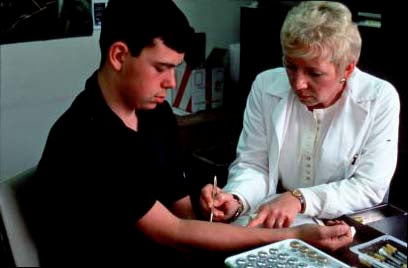How Do I Know if I’m Allergic to Latex?

Roughly 5 out of 100 people have a latex allergy, making it a fairly uncommon condition. However, many folks afflicted with the allergy might not even know they have it, as symptoms can sometimes be mild enough to ignore. No allergic reaction should be brushed aside, though, as allergies can worsen with increased exposure to the irritant. Here’s what to look out for in case you think you might have a latex allergy:
1. Redness and itching around the waist, chest, and shins
The most typical allergic reaction to latex comes in the form of skin irritation. Welts, hives, and general redness might occur at the parts of your body that are most often in contact with the substance because of clothing, namely: your waist (underwear bands), chest (bras and bra straps), and shins (socks). There’s also a chance these areas could itch, and the skin in the affected spots might dry out. At worst, the skin irritation feels like a burning sensation, so be on the lookout!
2. Runny nose and sneezing
Although a runny nose is usually associated with hay fever, it could also be the sign of an allergy to latex. Sneezing is another surprising symptom people don’t usually connect to latex, but it can happen when you accidentally inhale latex particles. This commonly happens with latex gloves, which also have a higher chance of being positioned near your nose while you’re working with them.
3. Itchy or teary eyes
This most often happens when items containing latex are worn on the face, like sleeping masks, although gloves are another common culprit. The irritants can land on the sensitive surface of your eyes, which will then tear up in an attempt to flush the latex out. You can also watch for redness in and around your eyes.
If you’re experiencing any of these symptoms after being exposed to latex, there’s a chance you’re allergic to it. Visit your immunologist to get tested for the allergy before it gets worse. If the tests do prove positive, make the switch to latex-free clothing and 100% organic cotton apparel as soon as you can. While allergies typically cannot be cured, they can be avoided. Remember, knowledge is your best friend when it comes to allergies.







